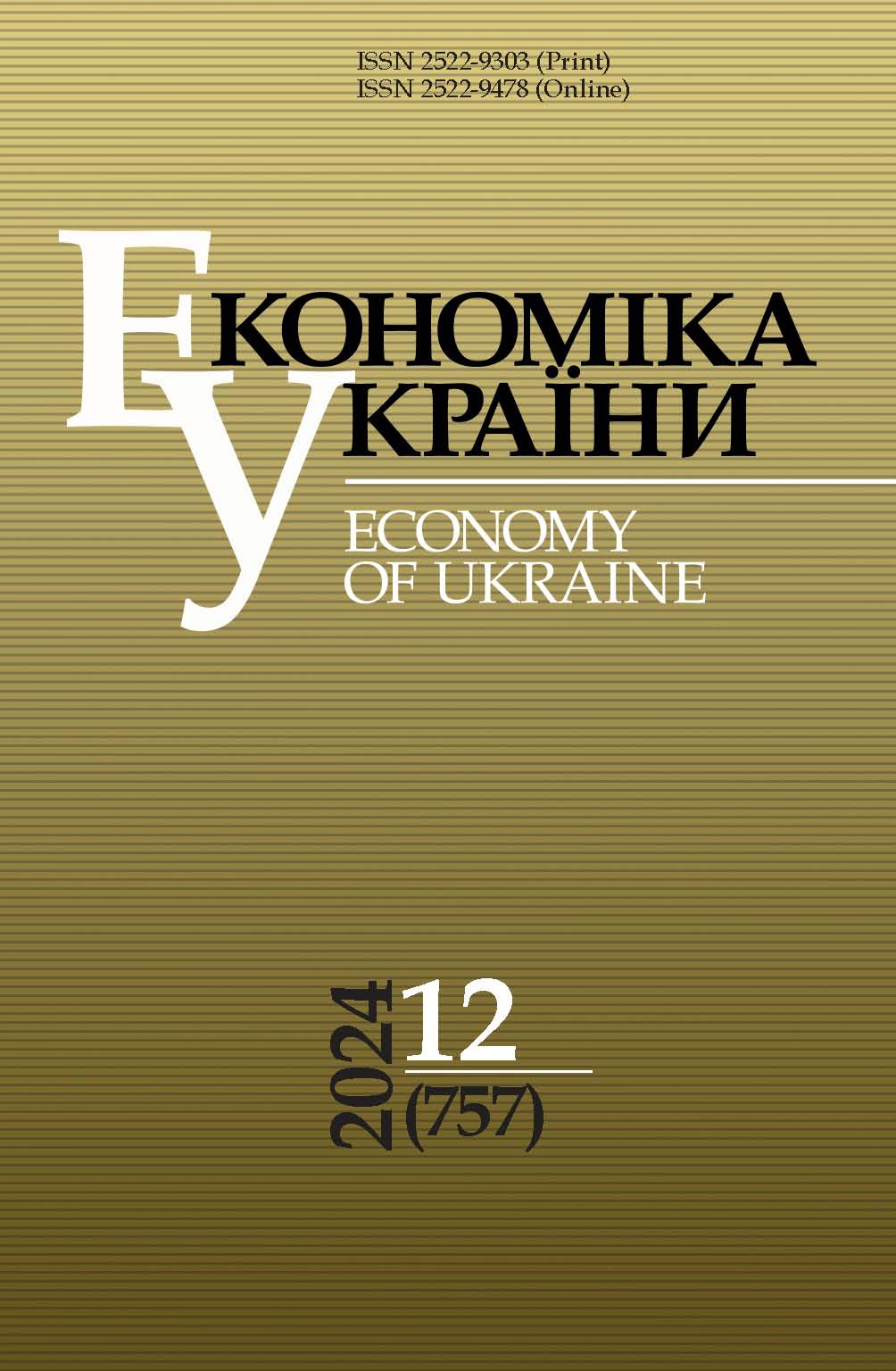SMART ECONOMY TOOLS: THEORETICAL AND PRACTICAL APPROACHES
DOI:
https://doi.org/10.15407/economyukr.2024.12.067Keywords:
smart economy; smart economy tools; ecosystem; innovations; economic space; territorial marketing; territorial and sectoral organizational models; digital technologies; socio-economic development; region; territorial community.Abstract
The main principles of the formation and development of smart economy as a complex ecosystem in which economic, social, and environmental components are balanced are investigated. From the perspective of strategic development of territories and regions, the meaning of each smart element, namely, specificity, measurability, attainability, relevance, and time-boundedness, is revealed. A set of smart economy tools is developed, with substantiating their characteristics and features which are advisable to use when developing strategic plans for the socio-economic development of regions and territorial communities, and their management. A model for the formation of smart economy elements is proposed. The concept of smart economy as a complex ecosystem that combines economic, environmental, social, and other components is substantiated. A systemic approach to managing the development of smart economy through optimal integration of its elements is considered. The need for comprehensive systemic research to study smart economy ecosystems is emphasized. It is underscored that entrepreneurial ecosystems require geographical definition and interaction with sectors and industries. The ecosystem approach is described as the basis for the principles of systemic development and evolutionary growth. The main elements of SMART are singled out as criteria for achieving goals in the smart economy. The use of integrated approach is proposed in the formation of strategic development plans at community, regional and state levels, with an emphasis on innovative resources and smart economy tools that will contribute to the balanced and comprehensive development of society. Emphasis is placed on the need for further study of global experience and for the implementation of smart economy tools in the socio-economic development of Ukraine drawing upon a practical approach to their use at the regional level.
References
Prasolova, K., Danylyshyn, B. (2022). Key determinants of regions smart specialization concept. Economy and Society, (46). https://doi.org/10.32782/2524-0072/2022-46-73 [in Ukrainian].
Kalenyuk, I., Uninets, I. (2021). Smart economy ecosystem in a global environment. Strategy of the Economic Development of Ukraine. 49. 5-20. https://doi.org/10.33111/sedu.2021.49.005.020 [in Ukrainian].
Severyn-Mrachkovska, L. (2021). The concept of smart economy in economic and philosophical discourse. In: S.B. Artemenko, O.B. Hayevska, L.V. Severyn-Mrachkovska et al. Interdisciplinary discourse in the study of phenomenon of the social. Kyiv. P. 87-96. URL: https://ir.kneu.edu.ua:443/handle/2010/36323 [in Ukrainian].
Rodchenko, V., Matyushenko, I., Navrotskyi, O. et al. (2019). Smart economic development: concepts and tools. Kharkiv. 204 p. URL: https://ekhnuir.karazin.ua/handle/123456789/15916 [in Ukrainian].
Youssef, A., Hajek, P. (2021). The role of smart economy in developing smart cities. In: Proceedings of the 2021 International Symposium on Computer Science and Intelligent Controls (ISCSIC). Rome, Italy (12–14 November 2021). P. 276-279. https://doi.org/10.1109/ISCSIC54682.2021.00057
Apostol, D., Balaceanu, C., Constantinescu, E. (2015). Smart-economy concept –– Facts and perspectives. URL: https://ipe.ro/RePEc/WorkingPapers/wpconf141113.pdf
Vyshnevskyi, V., Viyetska, O., Harkushenko, O. et al. (2018). Smart industry in the digital economy era: prospects, directions and mechanisms of development. V.P. Vyshnevskyi (Ed.). Kyiv. 192 p. URL: https://iie.org.ua/wp-content/uploads/2018/05/2018-Smart-promislovist-v-epohu-tsifrovoyi-ekonomiki.pdf [in Ukrainian].
Shults, S. (2010). Economic space of Ukraine: formation, structuring and management. Lviv. 408 p. [in Ukrainian].
Palekha, Yu. (2006). Economic and geographical aspects of the formation of the value of settlements’ territories. Kyiv. 324 p. [in Ukrainian].
Budnikevych, I. (2012). Municipal marketing: theory, methodology, practice. Chernivtsi. 648 p. [in Ukrainian].
Davymuka, S., Fedulova, L. (2016). Regional innovation ecosystems: directions of development in the context of European integration. Lviv. 464 p. [in Ukrainian].
Kurochkina, I. (2018). The Features of Development of Territorial Marketing in the Conditions of Digital Economy. Business Inform. No. 8. P. 258-263. URL: http://jnas.nbuv.gov.ua/article/UJRN-0000934114 [in Ukrainian].
Downloads
Published
How to Cite
Issue
Section
License
Copyright (c) 2024 Economy of Ukraine

This work is licensed under a Creative Commons Attribution-NonCommercial-NoDerivatives 4.0 International License.



